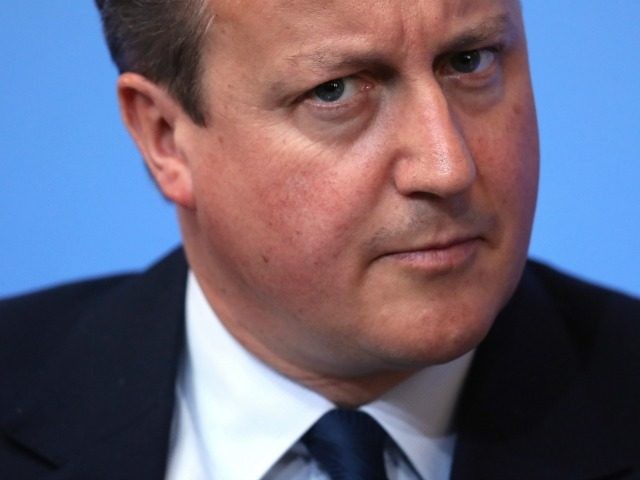I can think of only two explanations for David Cameron’s dodgy resignation honours list, in which he has showered knighthoods and gongs on all manner of cronies, lickspittles and catamites, ranging from his wife’s fashion stylist to the Labour apparatchik who ran the mendacious and unsuccessful Remain campaign, and which one former cabinet minister has described as “sticking two fingers up” at the Tory party.
The most obvious is that Cameron must live in a parallel universe where his six years as Prime Minister were a great success, culminating in a brilliant coup whereby he persuaded the majority of British people to vote Remain in the EU Referendum.
That, certainly, would explain his otherwise incomprehensible decision to make his former Chancellor George Osborne a Companion of Honour.
Traditionally, the Companion of Honour is given to men and women of rare distinction. Previous recipients include statesmen like Winston Churchill, authors such as Vita Sackville West, John Buchan and EM Forster, Proms founder Sir Henry Wood and Laurence Binyon (the poet whose For The Fallen is quoted every Remembrance Sunday). Current holders include Forces Sweetheart Dame Vera Lynne, conductor Sir Neville Marriner, whispery-voiced, gorilla-hugging Malthusian Sir David Attenborough and Sir Ian McKellen, the gay bearded wizard whose timely intervention at the battle of Helms Deep saved several kingdoms from being overwhelmed by the forces of darkness.
But apart from his novelty Christian name Gideon and the fact that one day he will inherit his father’s baronetcy and be entitled to call himself Sir, what exactly is George Osborne’s distinction?
Only being one of the biggest spivs ever to disgrace the office of Chancellor of the Exchequer.
Osborne had many flaws: he was a sinister, slippery, Mandelson-style Machiavel, much more interested in finessing the political process and building his power networks than he was doing the right thing; economically he was a notorious meddler, addicted to micromanaging and sleight of hand; he was far too easily impressed by the rich and powerful, be they Russian oligarchs or senior Chinese party officials; and he was much much too much of a Davos-style globalist, more than happy to see the little people kept in check by central bankers and the rest of the Bilderberg elite.
But he still might have got away with it had he not taken such a massive wrong bet on the EU referendum.
He decided to go all-in as an ardent Remainer, not out of any intellectual conviction but simply because he thought the EU-friendly Establishment was going to win.
To make damn sure that he won, he put all the weight of his office behind Project Fear: the campaign of lies and official misinformation and taxpayer-funded scaremongering – co-starring his tame pet monkey, Bank of England governor Mark Carney – designed to scare the ignorant masses into voting against their better judgement.
It was devious, it was unethical and – as Britain’s generally positive post-Brexit economic performance has proved – it was utterly dishonest.
Still, had it paid off, history would have applauded him for it, as history generally does to the victors.
Except – as Trevor Kavanagh rightly points out here – it didn’t pay off.
Mr Osborne got it stupendously wrong.
Not by picking the losing side in a legitimate argument, but by totally misjudging a defining moment in British history.
He blindly supported the Grand European Project in the face of incontrovertible evidence that it was already disintegrating under our feet.
So why, in heaven’s name, having abused his office, conspired so blatantly to frustrate the democratic will of the British people and been comprehensively showed up as a devious, lying loser, should Osborne end up being given one of the highest honours it is in the Prime Minister’s power to give?
What message does this send to all those past honours recipients who really have merited their rewards?
What message does it send to the cynics who say that the honours system is just an Establishment stitch up?
How is it ever going to incentivise better behaviour from our public servants when it seems so flagrantly to reward failure, and to value cronyism more highly than principle?
Well, as I say, by far the most plausible explanation for this is that David Cameron and the Eton/Oxford/Notting Hill cronies who’ve done so well out of his period treading water in office really do inhabit a universe entirely detached from ours; that they really do believe they’ve been a great success and that it’s entirely right that they should be rewarded more highly than, say, the people like Nigel Farage who actually did win the EU referendum campaign and so far have got precisely zilch.
I prefer it to the more depressing one, which is that we’ve just spent the last six years being run by the equivalent of that posho dining club modelled on the Bullingdon, and celebrated in the film (and play) The Riot Club.
When that play first came out, I wrote it off as a nasty exercise in chippy class war by a typical liberal-lefty playwright who’d never got over the fact that she didn’t get into Oxford. With hindsight, though, I’m beginning to wonder whether Laura Wade’s play doesn’t summon up perfectly the entire Cameron era.
A cosy clique of spoilt toffs with a weapons-grade sense of entitlement took over our honest country pub, ponced up about in stupid outfits like they owned the place, shat all over the ordinary people just trying to make an honest living, then vanished into the night as suddenly as they’d come leaving the grown-ups to clear up the mess.
Tossers. Good riddance to the lot of them.

COMMENTS
Please let us know if you're having issues with commenting.